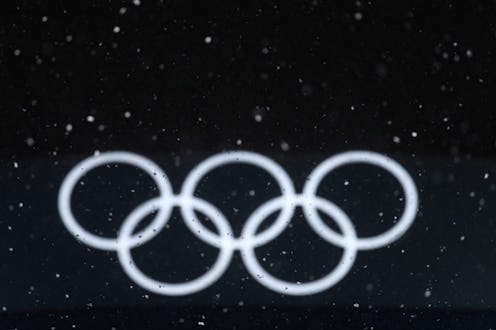News
Why The Closing Ceremony Is Basically Going To Feel Like It's Taking Place Outdoors

On Sunday, Feb. 25, the 2018 Winter Olympics will officially come to a close, with the closing ceremony scheduled to take place at 6:00 a.m. ET. But after weeks of freezing temperatures, anyone who's been following the games to this point may have a temperature-related question on their minds: will the 2018 Olympics closing ceremony stadium be heated? Or will all those athletes, dignitaries, and spectators be braving the frigid weather?
The answer, sad to say for anyone in attendance (looking at you, Ivanka Trump), is no. The PyeongChang Olympic Stadium isn't a heated venue, for a very conspicuous reason ― it doesn't have a roof to help protect it from the elements. To the contrary, according to an internal International Olympic Committee (IOC) document obtained by Reuters, the stadium neither had a heating system nor a roof, because both were deemed too expensive, and because of concerns that the structure couldn't actually support a roof.
In other words, all the spectators who watched the opening ceremony in person, and all those who'll be doing the same for the closing ceremony, are going to be relying on the oldest cold weather trick in the book: dress in really, really, really warm clothing.
These have been some of the coldest Winter Olympics ever, as well as with some of the most problematic weather. Multiple alpine skiing events ended up being delayed and rescheduled due to high winds sweeping across the tracks, a fact which forced some top talent, like U.S. skier Mikaela Shiffrin, to bow out of some events.
In short, the low temperatures ― according to AccuWeather, PyeongChang averages just 23 degrees Fahrenheit in the month of February ― have made their presence felt all throughout the games. Some of the skiers have also complained of the snow being too cold, such that it damaged their skis in training runs.
And it'll rear its head one last time on Sunday, when the temperatures during the ceremony (it's taking place at night in PyeongChang local time) will once again send chills through the bodies of all in attendance. During the opening ceremony, it was so chilly that mobile devices exposed to the air for even a few minutes were reportedly rendered useless, their batteries drained by the biting cold.
Basically, all of this is an elaborate way of saying that it'd be great if the Olympic stadium was an enclosed structure with some manner of central heating system. But alas, that's not how it was planned, designed, or built, and thus sitting in the stands is an active battle with the elements. Any temperature below 38 degrees Fahrenheit, to be clear, is below freezing. At the time of this writing, it's approximately 7:00 a.m. local time in PyeongChang, and it's approximately 30 degrees Fahrenheit.
It's impossible to predict with perfect accuracy where those numbers will be by the time the ceremony starts. But hopefully, for the sake of everyone attending, it starts to warm up a little bit before things really get underway.
If you're looking to catch the closing ceremony ― and if you enjoyed all the artistry and dazzling visuals of the opening ceremony, why wouldn't you be? ― you'll be able to see it on Sunday evening, when NBC airs it in primetime.
In real time, to be clear, it'll be beginning at roughly 6:00 a.m. ET, but as with so much of its Olympics coverage, NBC will be airing it at 8:00 p.m. ET on Sunday evening. In short, if you're a Winter Olympics fan, you're going to want to set aside some time to watch, because this is your last taste until Beijing in 2022.